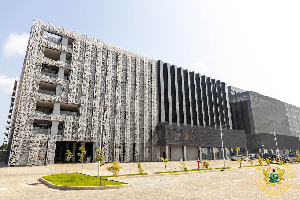Accra, Nov. 14, GNA - Ghana's disease burden has increased and experienced a slight change since independence with life expectancy rate dropping from 78 years before independence to 56 years in 2005 though financial resources to the health sector has increased over the years. The diseases are mostly associated with nutrition; reproduction, environment and lifestyles. The slow progresses in health outcomes and stagnated health indicators have also contributed to the increased disease burden.
Major Courage Quashigah (Rtd), Minister of Health, made the revelations at the opening of this year's health summit under the theme "Creating Wealth through Health" in Accra on Tuesday.
The five-day meeting will enable the Ministry and its health partners to review the Five-Year Programme of Work (5YPOW) from 2002-2006 and preview the new 5YPOW, which will begin from 2007. The 5YPOW is linked more closely to poverty reduction through the Ghana Poverty Reduction Strategy (GPRS) to improve efficiency in the health sector; foster closer collaboration and partnership; increase geographical and financial access to basic services and ensure equity and efficiency of the distribution system in the health sector. Major Quashigah noted that most of the health sector investments and actions were channelled to the delivery of bio-medical interventions, saying, "we are aware that, if the current pace continues, we will find it tough to achieve the health related Millennium Development Goals (MDGs)".
He said the Sector was challenged with poor functioning of the health system, which made it unlikely to achieve the MDGs related to maternal mortality reduction, adding, "Ghana's health system is threatened by the brain drain, frequent industrial actions, obsolete equipment and inadequate access to health services".
Other challenges affecting the Sector in achieving its POW were complexities inherent in the changing systems for health financing, rhetoric of partnerships, which were gradually showing progress with the recent integrated polio and measles campaign as an example.
Major Quashigah said a new health policy had been drafted under the theme "Creating Wealth through Health" to respond to the numerous concerns raised by the Ministry.
The draft policy is people-cantered; multi-sectoral in orientation and results oriented. It recognizes that health is created from peoples' life circumstances, what they eat, do, and the environment they live in.
"The new health policy would ensure among other things that people are healthy, productive and are able to save on cost of medical care, that the future generation is healthy and recognizes that a health industry creates jobs, contributes to wealth creation and national and economic development", the Health Minister said.
Major Quashigah noted that the Sector would need about 7.7 trillion cedis to implement its programmes in 2007 but have been able to mobilize 5.7 trillion cedis and urged development partners to fill the gap of two trillion cedis.
He expressed concern about the un-timeliness and unpredictability in the flow of funds by development partners and cited an example of development partners not disbursing close to 12 million dollars most of which was to support the implementation of the high impact rapid delivery programmes for improving the health of mothers and children.
"At the end of October 2006, nearly 18 million dollars of funds pledged by donors has not been disbursed. Within this context, how can the Sector implement its programmes successfully and achieve its targets?
He said the Ministry would again require 1.8 trillion cedis in 2007 to respond to its capital investments needs and urged the partners to increase funding to the Sector to fill the huge financial gap. Major Quashigah called for committed health workers and the support of the development partners to help in the implementation programmes of the Ministry for a healthy population and nation.
Mr M.J.P Bierkenes of the Dutch Embassy on behalf of the development partners said the new 5YPOW would require a new Common Management Arrangement since there had been a change in doing business in development co-operation facilitated by positive development.
He noted that the development partners would be looking forward to a renewed partnership in which the partners, the Ministry of Health and other stakeholders would engage in a constructive and productive dialogue to achieve the objectives of the MDGs and the Growth and Poverty Reduction Strategy II. 14 Nov. 06
General News of Tuesday, 14 November 2006
Source: GNA












